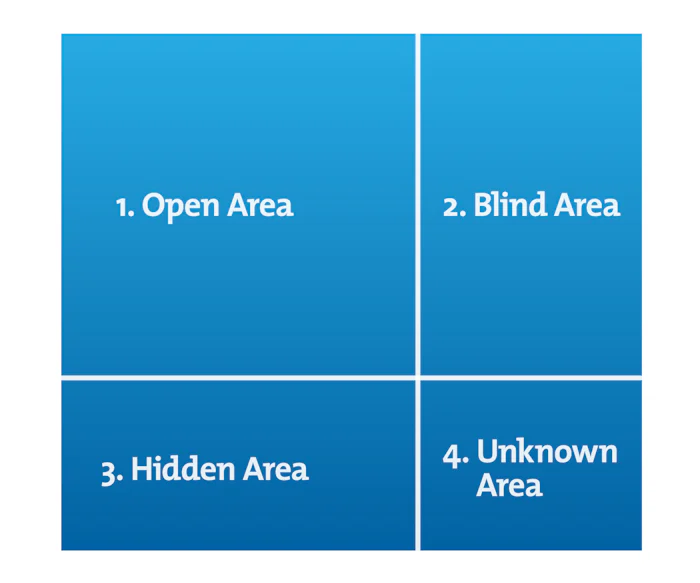Developed by two psychologists to help people improve their understanding of themselves and others, the Johari Window is a type of heuristic tool that examines the biases and criticisms we may or may not be aware of that motivates our behavior. The Johari Window is typically introduced during group therapy in addiction treatment programs to encourage honest communication among group members by revealing what other people assume or believe about us.
The foundation of the Johari Window involves two specific concepts:
- Providing insightful information about yourself to others can establish trusting relationships with others.
- Listening objectively to other people’s observations about your behavior and attitude will increase your ability to deal successfully with your personal problems.
The Four Quadrants of the Johari Window

Quadrant 1: Open Area
Quadrant 1 represents everything that you and others know about you (personality, skills, superficial behaviors, and public knowledge about your past and present).
Quadrant 2: Blind Area
This quadrant holds things that you are not aware of about yourself but that other people understand about you. For example, you may be a funny person but don’t realize it until others tell you that you have a great sense of humor.
Quadrant 3: Hidden Area
The Hidden Area includes things you don’t want anyone else to know about you. While it is normal and reasonable for people to keep secrets about themselves, concealing particular information about yourself from group therapy members may interfere with receiving valuable insights about your addiction from your peers.
Quadrant 4: Unknown Area
The Unknown Area represents things that remain unknown and unidentified by you and others. An example of a Quadrant 4 observation would be a person in their 30s taking piano lessons for the first time and suddenly discovering they have an incredible talent for playing the piano.
How to Use the Johari Window
Designed to be utilized by a group of people and not individually, the Johari Window’s primary goal is for each person to expand their Open Area (Quadrant 1).
Each member of the group is directed to do the following:
Identify and describe their personality characteristics. Choose from this list of words (or use similar words) to describe their personality. Then, the person is prompted to deliberate on their inner self. In addition, the other members of the group receive the same list of adjectives, choose which adjectives they think describe the person who is filling in Quadrant 1, and place these adjectives into the appropriate quadrants.
Here are examples of commonly used Johari Window adjectives:
- Confident
- Brave
- Independent
- Sympathetic
- Patient
- Calm
- Sensible
- Witty
- Extroverted
- Nervous
- Shy
- Logical
- Silly
- Quiet
- Empathetic
- Intelligent
- Realistic
- Talkative
The Johari Window is an effective therapeutic tool for helping people in addiction recovery discover themselves in an objective and methodical manner. Most of us panic at the thought of how our peers perceive us, even if their perceptions are positive. However, learning the truth about what other people really believe about us is a powerful technique for increasing self-esteem, reducing self-doubt, and aiding a person’s resolve to defeat an addiction. The Johari Window will also enhance a person’s understanding of why they sometimes make the wrong choices and what they can do to change that pattern of self-sabotage.
Call Hickory Treatment Centers today for more information about our residential treatment programs.

